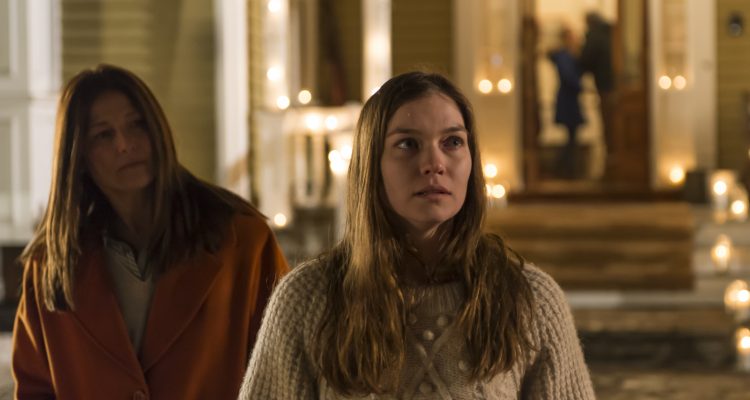A mystery lies at the shattered core of “Unless,” but it’s not your standard whodunit. Instead, the drama centers on what has caused a college student who argues with her professor over “Madame Bovary” to change into an unspeaking woman begging on the street of the Toronto winter in less than a month. Based on the final novel from author Carol Shields, this quiet Canadian-Irish film wears its heart and its literary roots on its nubby, woolen sleeve.
We spend just a few seconds with Norah (Hannah Gross) before we see her transformed. The first few minutes of “Unless” are an average morning while she’s home from college, with her mother Reta (Catherine Keener) making breakfast for her three daughters while her husband, Tom (Matt Craven), dotes on his wife. The next scene tells us that just 19 days have passed, but Norah has left school for a patch of pavement in the city, sitting on the cold ground in a jacket, with a cardboard sign that simply says, “Goodness.” She sits mute, barely acknowledging the presence of her parents and sisters as they visit her and question what happened and why. Daffodils bloom through snow, and the winter goes on endlessly, with Norah still in the same spot.
Reta is an accomplished writer and translator, and the irony that she can’t communicate with her own daughter won’t be lost on anyone in the audience. The script from writer-director Alan Gilsenan features plenty of narration, but Reta’s profession lends itself to this device. If the prose (presumably from Shields’ source novel) weren’t so beautifully composed – and so well performed by Keener – it’d be easy to complain about its presence; instead, it’s the type of writing that you’d luxuriate in if you saw it on the page.
Despite its origins in prose, “Unless” veers toward the lyrical, alternately to its credit and its detriment, thanks to its screenplay as well as the cinematography from Celiana Cárdenas that captures images vividly and with plenty of poetry. However, it uses slowmo so much that Zack Snyder would be proud, making “Unless” occasionally feel like it’s wallowing in its own arty puddle. At other moments, the film feels entirely grounded in the awful reality of both Norah and her family’s lives. There’s a rawness to it that feels rare for a film so carefully made in other aspects, particularly one where the stitching sometimes shows.
“Unless” spends a lot of its time emphasizing the cruelty of the world surrounding Reta, Norah and their family. Whether it’s the debilitating illness suffered by a collaborator, the plight of Norah’s fellow panhandlers or violence on the news, it sometimes seems like a movie-length exploration of “Why do bad things happen to good people?” But it saves its most disturbing moments for its final third, with one of its last scenes sure to make an indelible mark on viewers.
Somehow distilled down from the 340 pages of its source novel, Gilsenan’s drama manages to pack in a season of wrenching subject matter into its slim 93-minute running time. It’s also worth mentioning the movie’s clear feminist message and viewpoint, right from its opening scene that shows a breast self-exam in close-up, treating it as if this is nothing special. There’s plenty to digest here, leaving viewers thinking about the film long after the credits roll. [B]
Click here for our complete coverage of the 2016 Toronto International Film Festival

